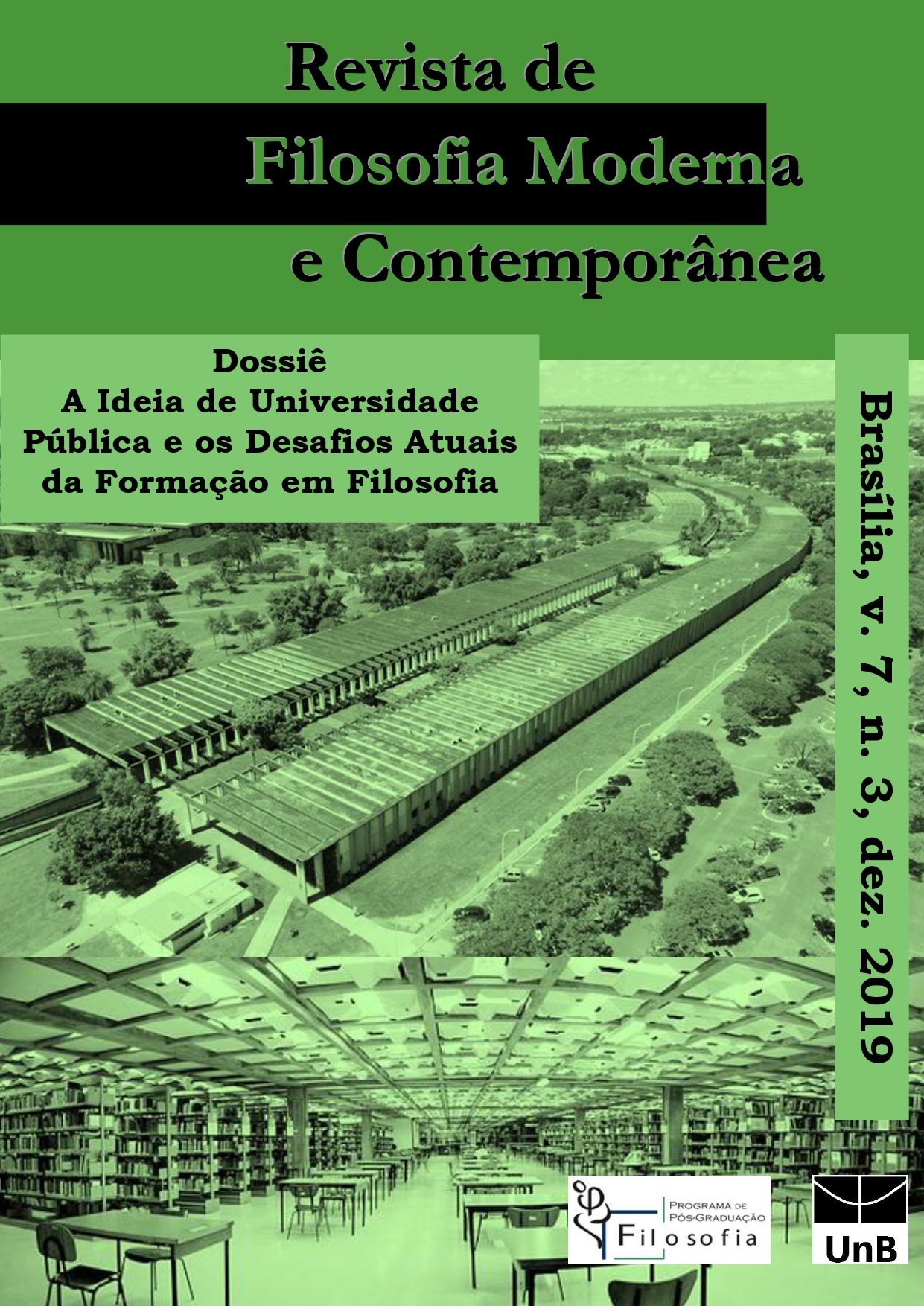Crisis, University and Humanities in Perspective: Notes on the Conditions and Limits of Education in Philosophy
DOI:
https://doi.org/10.26512/rfmc.v7i3.29302Keywords:
rationality, university, philosophical education, philosophical methodology, historyAbstract
The following essay investigates the challenges facing those who are dealing with the university crisis. Its aim is to present three moments of the activity of rational production of knowledge: a portrait of some pre-modern experiences of the search for knowledge, the crisis of the model of history that organizes modernity and some guidelines that structure both the university system and the philosophical education. At the end of this journey, the article points out some of the challenges that are presented to those who deal with the slow and intimate time of study in times governed by instructions and prohibitions driven by a dynamic of accelerated time.
References
ARANTES, P. E. Departamento francês de ultramar. São Paulo: Paz e Terra, 1995.
___.; ARANTES, O. F. Sentido da formação: três estudos sobre Antonio Candido, Gilda de Mello e Souza e Lúcio Costa. São Paulo: Ed. Paz e Terra, 1997.
___. “O novo tempo do mundo: a experiência da história numa era das expectativas decrescentes”. In: ___. O novo tempo do mundo. São Paulo: Boitempo, 2014.
CADERNO DE RESUMOS do 1º Simpósio Internacional de Humanidades, IH-UnB, 21-23 out. 2019. In: https://drive.google.com/file/d/1SjSyuY7M8-VMxXRvgyZ2aE12gdcHKBC6/view, acessado em 28 de outubro de 2019, Ã s 22h53.
CAMPO, J. E. Encyclopedia of Islam. Nova York: Facts On File, 2009 [Encyclopedia of World Religions].
CORDEIRO, D. S. A formação do discernimento: Jean Maugüé e a gênese de uma experiência filosófica no Brasil. Tese de Doutorado. Departamento de Filosofia, Universidade de São Paulo, 2008.
FABRINI, R. “O ensino de filosofia: a leitura e o acontecimento”. Trans/Form/Ação, 28(1), p. 7-27, 2006.
GAGNEBIN, J. M. “O método desviante: algumas teses impertinentes sobre o que não fazer num curso de filosofia”. In: https://uspcaf.files.wordpress.com/2011/06/gagnebin-j-m-o-mc3a9todo-desviante.pdf, acesso em 28 de outubro de 2019, Ã s 17h32.
GIANNOTTI, J. A. In: v.a., “Por que filósofo”?. Estudos Cebrap (15), jan.-mar. 1976, p. 133-173.
GOLDSCHMIDT, V. “Tempo lógico e tempo histórico na interpretação dos sistemas filosóficos”. In: A religião de Platão. Trad. Ieda e Osvaldo PORCHAT. São Paulo: DIFEL, 1963.
GUÉROULT, M. Dianoématique: Philosophie de l’histoire de la philosophie. Collection. Analyse e Raisons. Paris: Aubier Montaigne, 1979.
KANT, I. “Resposta à pergunta: o que é esclarecimento?”. Trad. V. FIGUEIREDO. In: MARÇAL, J.(Org.). Antologia de textos filosóficos. Curitiba: Secretaria de Estado da Educação do Paraná, 2009, p. 406-15.
KANT, I. O que significa orientar-se no pensamento? 3. ed. Trad. Floriano de Souza FERNANDES. Petrópolis: Vozes, 2005.
KOSELLECK, R. Futuro passado: contribuição à semântica dos tempos históricos. Rio de Janeiro: Contraponto, 2006.
LEOPOLDO E SILVA, F. “A função social do filósofo”. In: ARANTES, P. et al. (Orgs.). A filosofia e seu ensino. São Paulo: Educ, 1993a.
___. “Currículo e formação: o ensino da filosofia”. Revista Síntese, Belo Horizonte (20, n. 63), p. 797-806, out./dez. 1993b.
MAUGÜÉ, J. “O ensino de filosofia: suas diretrizes”. Revista Brasileira de Filosofia (V, n.20), out./dez. 1955, p. 642-9.
MARTIN, R. R., editor-chefe. Encyclopedia of Islam and the Muslim World, 2 v., Nova York: Macmillan Reference USA, Thompson Gale, 2003-4.
MOURA, C. A. R. de. “História stultitiae e história sapientiae”. Revista Discurso (17), 1988, p. 151-71.
PORCHAT, O. “Prefácio”. In: V. GOLDSCHMIDT. A religião de Platão. São Paulo: Difusão Européia do Livro, p. 5-10, 1963.
RANCIÈRE, J. O mestre ignorante: cinco lições sobre a emancipação intelectual. Trad. Lílian do VALLE. Belo Horizonte: Autêntica, 2002.
TORRES FILHO, R. R. “Respondendo à pergunta: quem é a ilustração?”. Discurso (14), p. 101-112, 1983
VECKET, J. A. “Abecedarians”. In: HERBERMANN, C. B.; PACE, E. A.; PALLEN, C.E.(Eds.). The Catholic encyclopedia; an international work of reference on the constitution, doctrine, discipline and history of the Catholic Church, 14 v., Nova York: Robert Appleton Company, v. 1, p. 35.
WAIZBORT, L. “Formação, especialização, diplomação: da universidade à instituição de ensino superior”. Tempo Social, 27(2), p. 45-74, 20.
Downloads
Published
Issue
Section
License
Copyright for articles published in this journal is retained by the authors, with first publication rights granted to the journal. By virtue of their appearance in this open access journal, articles are free to use, with proper attribution, in educational and other non-commercial settings.


